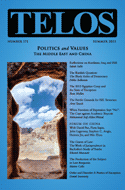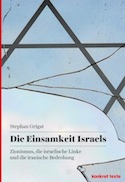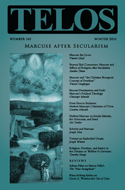By Telos Press · Thursday, August 27, 2015 In a new interview with Karmel Melamed in the Jewish Journal, Matthias Küntzel discusses the history of antisemitism in Iran, a topic he explores in detail in his new book Germany and Iran: From the Aryan Axis to the Nuclear Threshold. Purchase your copy of the book in our online store.
Continue reading →
By Arno Tausch · Monday, August 24, 2015
 This article presents statistical estimates of ISIL support in the Muslim world, based on Pew data covering 42 percent of the total global Muslim population on favorability of four terror organizations, to be well compared with ISIL: Hamas, Hezbollah, the Taliban, and al Qaeda, and the favorability of suicide bombing. It is assumed that these data (average support rates) reflect the true, but unknown, rates of ISIL support, which will be at somewhere around 17 percent of the entire global Muslim population. The article analyzes mechanisms that contribute towards ISIL favorability, such as anti-Americanism, the hatred of the State of Israel, and the advance of violent Islamism. Finally a comparison of the evolving terror scene with the conflict in Northern Ireland is also outlined. This article presents statistical estimates of ISIL support in the Muslim world, based on Pew data covering 42 percent of the total global Muslim population on favorability of four terror organizations, to be well compared with ISIL: Hamas, Hezbollah, the Taliban, and al Qaeda, and the favorability of suicide bombing. It is assumed that these data (average support rates) reflect the true, but unknown, rates of ISIL support, which will be at somewhere around 17 percent of the entire global Muslim population. The article analyzes mechanisms that contribute towards ISIL favorability, such as anti-Americanism, the hatred of the State of Israel, and the advance of violent Islamism. Finally a comparison of the evolving terror scene with the conflict in Northern Ireland is also outlined.
Continue reading →
By Arno Tausch · Tuesday, May 19, 2015  Die Einsamkeit Israels: Zionismus, die israelische Linke und die iranische Bedrohung (Israel’s Solitude: Zionism, the Israeli Left, and the Iranian Threat), by the German political scientist Stephan Grigat, is an important contribution to the overall debate on the Middle East, and it was published just in time, given the background of the Lausanne negotiations with Iran. Grigat dispels the current euphoria about the “breakthrough in Lausanne” and illuminates the many existing darker sides of the Lausanne deal. The present reviewer is of the opinion that, particularly in view of the special historical responsibility of Continental Europe, a careful reconsideration of the realities created in Lausanne and the considerable role played by the EU foreign policy machinery is necessary and that the other side in the conflict—the side of Israel—is also being heard. Die Einsamkeit Israels: Zionismus, die israelische Linke und die iranische Bedrohung (Israel’s Solitude: Zionism, the Israeli Left, and the Iranian Threat), by the German political scientist Stephan Grigat, is an important contribution to the overall debate on the Middle East, and it was published just in time, given the background of the Lausanne negotiations with Iran. Grigat dispels the current euphoria about the “breakthrough in Lausanne” and illuminates the many existing darker sides of the Lausanne deal. The present reviewer is of the opinion that, particularly in view of the special historical responsibility of Continental Europe, a careful reconsideration of the realities created in Lausanne and the considerable role played by the EU foreign policy machinery is necessary and that the other side in the conflict—the side of Israel—is also being heard.
Continue reading →
By Dirk Braunstein · Wednesday, August 27, 2014 An article by Hamid Dabashi recently appeared in the online version of the English-language edition of Al Jazeera. Dabashi teaches Iranian Studies and Comparative Literature at Columbia University, where the exiled Frankfurt School thinkers Max Horkheimer and Theodor Adorno found refuge during the period of National Socialism. Dabashi quotes Adorno’s 1949 thesis that it is barbaric to write poetry after Auschwitz and asks what it really means: “How could writing poetry after a calamity such as Auschwitz, and by extension a horror like the Holocaust, be something barbaric? Doesn’t poetry console in moments of mourning and despair?”
Continue reading →
By Zvi Tauber · Thursday, January 30, 2014 Zvi Tauber’s “Herbert Marcuse on Jewish Identity, the Holocaust, and Israel” appears in Telos 165 (Winter 2013). Read the full version online at the Telos Online website, or purchase a print copy of the issue in our store.
 The article focuses at three themes of Herbert Marcuse’s approach, views, and attitudes concerning Judaism, Jewish history and the State of Israel. Marcuse, whose research and philosophy only marginally addressed the “Jewish question,” never denied his Jewish origins, but at the same time he never used this objective fact as an exclusive or decisive argument to affect his views on various issues, not even regarding world-historical matters of particular relevance to the Jews. Even if generally, positively, Marcuse endeavored to constitute the Marxian Realm of Freedom, or at least strove to fathom scientifically why in the course of modern history, an authentic revolution for the liberation of man has failed repeatedly, his major, immediate, intellectual and socio-political concern was the struggle against the reemergence of an oppressive reign of horror, including a struggle against the possible recurrence of a genocide. The article focuses at three themes of Herbert Marcuse’s approach, views, and attitudes concerning Judaism, Jewish history and the State of Israel. Marcuse, whose research and philosophy only marginally addressed the “Jewish question,” never denied his Jewish origins, but at the same time he never used this objective fact as an exclusive or decisive argument to affect his views on various issues, not even regarding world-historical matters of particular relevance to the Jews. Even if generally, positively, Marcuse endeavored to constitute the Marxian Realm of Freedom, or at least strove to fathom scientifically why in the course of modern history, an authentic revolution for the liberation of man has failed repeatedly, his major, immediate, intellectual and socio-political concern was the struggle against the reemergence of an oppressive reign of horror, including a struggle against the possible recurrence of a genocide.
Continue reading →
By Russell A. Berman · Tuesday, December 10, 2013 The National Council of the American Studies Association has voted to endorse a boycott of Israeli academic institutions. That decision is now subject to a ratification vote by the ASA’s membership, which will be completed on Dec. 15.
While the ASA website prominently displays support for the boycott, it has to date not given equal play to the many opponents of the boycott within the association. In order to give space to the ASA dissidents and in the interest of academic freedom, Telos publishes the following documents: a communication by former ASA President Shelley Fisher Fishkin to Executive Director John Stephens, of Dec. 8, and a Letter in Opposition to the boycott signed by numerous ASA members, including seven former presidents.
Continue reading →
|
|
 This article presents statistical estimates of ISIL support in the Muslim world, based on Pew data covering 42 percent of the total global Muslim population on favorability of four terror organizations, to be well compared with ISIL: Hamas, Hezbollah, the Taliban, and al Qaeda, and the favorability of suicide bombing. It is assumed that these data (average support rates) reflect the true, but unknown, rates of ISIL support, which will be at somewhere around 17 percent of the entire global Muslim population. The article analyzes mechanisms that contribute towards ISIL favorability, such as anti-Americanism, the hatred of the State of Israel, and the advance of violent Islamism. Finally a comparison of the evolving terror scene with the conflict in Northern Ireland is also outlined.
This article presents statistical estimates of ISIL support in the Muslim world, based on Pew data covering 42 percent of the total global Muslim population on favorability of four terror organizations, to be well compared with ISIL: Hamas, Hezbollah, the Taliban, and al Qaeda, and the favorability of suicide bombing. It is assumed that these data (average support rates) reflect the true, but unknown, rates of ISIL support, which will be at somewhere around 17 percent of the entire global Muslim population. The article analyzes mechanisms that contribute towards ISIL favorability, such as anti-Americanism, the hatred of the State of Israel, and the advance of violent Islamism. Finally a comparison of the evolving terror scene with the conflict in Northern Ireland is also outlined.  Die Einsamkeit Israels: Zionismus, die israelische Linke und die iranische Bedrohung (Israel’s Solitude: Zionism, the Israeli Left, and the Iranian Threat), by the German political scientist Stephan Grigat, is an important contribution to the overall debate on the Middle East, and it was published just in time, given the background of the Lausanne negotiations with Iran. Grigat dispels the current euphoria about the “breakthrough in Lausanne” and illuminates the many existing darker sides of the Lausanne deal. The present reviewer is of the opinion that, particularly in view of the special historical responsibility of Continental Europe, a careful reconsideration of the realities created in Lausanne and the considerable role played by the EU foreign policy machinery is necessary and that the other side in the conflict—the side of Israel—is also being heard.
Die Einsamkeit Israels: Zionismus, die israelische Linke und die iranische Bedrohung (Israel’s Solitude: Zionism, the Israeli Left, and the Iranian Threat), by the German political scientist Stephan Grigat, is an important contribution to the overall debate on the Middle East, and it was published just in time, given the background of the Lausanne negotiations with Iran. Grigat dispels the current euphoria about the “breakthrough in Lausanne” and illuminates the many existing darker sides of the Lausanne deal. The present reviewer is of the opinion that, particularly in view of the special historical responsibility of Continental Europe, a careful reconsideration of the realities created in Lausanne and the considerable role played by the EU foreign policy machinery is necessary and that the other side in the conflict—the side of Israel—is also being heard.  The article focuses at three themes of Herbert Marcuse’s approach, views, and attitudes concerning Judaism, Jewish history and the State of Israel. Marcuse, whose research and philosophy only marginally addressed the “Jewish question,” never denied his Jewish origins, but at the same time he never used this objective fact as an exclusive or decisive argument to affect his views on various issues, not even regarding world-historical matters of particular relevance to the Jews. Even if generally, positively, Marcuse endeavored to constitute the Marxian Realm of Freedom, or at least strove to fathom scientifically why in the course of modern history, an authentic revolution for the liberation of man has failed repeatedly, his major, immediate, intellectual and socio-political concern was the struggle against the reemergence of an oppressive reign of horror, including a struggle against the possible recurrence of a genocide.
The article focuses at three themes of Herbert Marcuse’s approach, views, and attitudes concerning Judaism, Jewish history and the State of Israel. Marcuse, whose research and philosophy only marginally addressed the “Jewish question,” never denied his Jewish origins, but at the same time he never used this objective fact as an exclusive or decisive argument to affect his views on various issues, not even regarding world-historical matters of particular relevance to the Jews. Even if generally, positively, Marcuse endeavored to constitute the Marxian Realm of Freedom, or at least strove to fathom scientifically why in the course of modern history, an authentic revolution for the liberation of man has failed repeatedly, his major, immediate, intellectual and socio-political concern was the struggle against the reemergence of an oppressive reign of horror, including a struggle against the possible recurrence of a genocide. 

